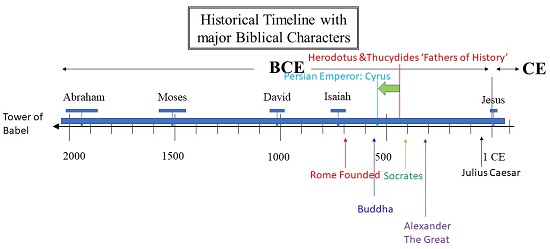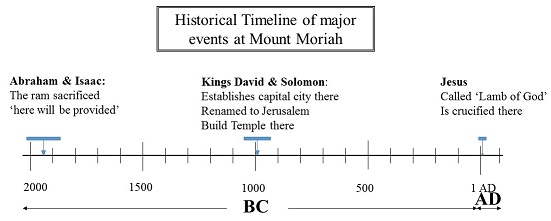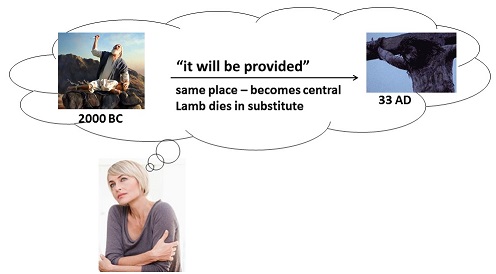We saw how Isaiah used the image of The Branch. A ‘he’ from the fallen dynasty of David, possessing wisdom and power was coming. Then Jeremiah followed up by stating that this Branch would be known as the LORD (the Old Testament name for God) himself.
Zechariah continues The Branch
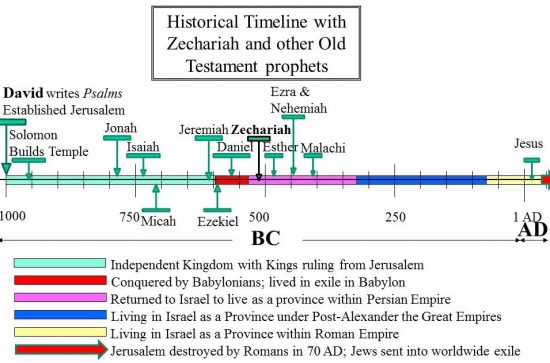
The prophet Zechariah lived 520 BCE, just after the Jewish people returned to Jerusalem from their first exile to Babylon. At that time, the Jewish people were rebuilding their destroyed temple. The High Priest then was a man named Joshua, and he was re-starting the work of priests. Zechariah, the prophet, was partnering with his colleague Joshua, the High Priest, in leading the Jewish people. Here is what God – through Zechariah- said about this Joshua:
‘”Listen O High Priest Joshua and your associates seated before you, who are men symbolic of things to come: I am going to bring my servant the Branch.” …, says the LORD Almighty, “and I will remove the sin of this land in a single day”.’
Zechariah 3:8-9
The Branch! Started by Isaiah 200 years before, continued by Jeremiah 60 years earlier, Zechariah carries on further with ‘The Branch’. Here God also calls the Branch ‘my servant’. In some way the High Priest Joshua in Jerusalem at 520BCE, colleague of Zechariah, was ‘symbolic’ of this coming Branch.
But how?
It says that in ‘a single day’ the sins will be removed by the LORD. How would that happen?
The Branch: Uniting Priest and King
To understand we should know that God strictly separated the roles of Priest and King in the Bible. None of the Kings could be priests, and the priests could not be kings. The role of the priest was to mediate between God and man by offering sacrifices to God. The responsibility of the King was to rule with justice from the throne. Both were crucial; both were distinct. Yet Zechariah wrote that in the future:
The word of the Lord came to me:…
Zechariah 6:9
Take the silver and gold and make a crown, and set it on the head of the high priest, Joshua son of Jozadak.12 Tell him this is what the Lord Almighty says: ‘Here is the man whose name is the Branch, and he will branch out from his place and build the temple of the Lord. 13 It is he who will build the temple of the Lord, and he will be clothed with majesty and will sit and rule on his throne. And he will be a priest on his throne. And there will be harmony between the two.’
Zechariah 6: 11-13
Against previous precedent, Joshua, the high priest in Zechariah’s day, was to symbolically put on the king’s crown as the Branch. (Remember Joshua was ‘symbolic of things to come’). Joshua, the High Priest, by putting on the crown prophesied a future uniting of King and Priest into one person. This coming Branch would be a priest on the King’s throne. Furthermore, Zechariah wrote that ‘Joshua’ was the name of the Branch. What did that mean?
The name ‘Joshua’ is the name ‘Jesus’
We had summarized pertinent details of Bible translation here necessary to understand further. The original Hebrew Bible was translated into Greek in 250 BCE, and called the Septuagint or LXX. We saw how the Septuagint made the title ‘Christ’ well-known. Here we follow that same analysis for ‘Joshua’.
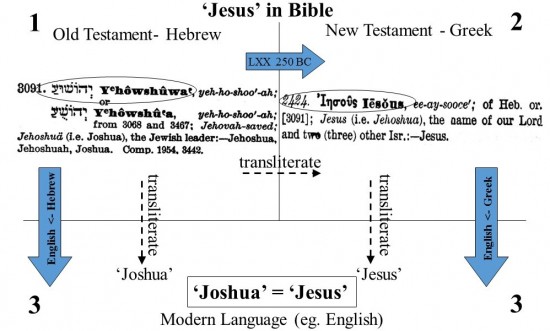
Joshua is a Hebrew transliteration of the original Hebrew name ‘Yhowshuwa’. Quadrant #1 shows how Zechariah wrote ‘Joshua’ as ‘Yhowshuwa’ in Hebrew in 520 BCE. Scholars transliterate the Hebrew ‘Yhowshuwa’ in modern Bible translations (#1-> #3). ‘Yhowshuwa’ in Hebrew is the same as Joshua in modern languages like English. But when the Septuagint was translated from Hebrew to Greek in 250 BCE Yhowshuwa was transliterated to Iesous (#1 -> #2). ‘Yhowshuwa’ in Hebrew is the same as Iesous in Greek. When scholars translate the Greek New Testament to modern languages (like English), Iesous is transliterated to ‘Jesus’ (#2 -> #3). Iesous in Greek is the same as Jesus.
People called Jesus ‘Yhowshuwa‘ when they spoke to him in Hebrew. But the writers of the Greek New Testament wrote his name as ‘Iesous’. This was exactly as the Greek Old Testament Septuagint wrote that name. In New Testament translations of today’s modern languages (#2 -> #3) ‘Iesous’ is transliterated to the familiar ‘Jesus’.
So the name: ‘Yhowshuwa’ = ‘Jesus’ = ‘Joshua’.
The name ‘Jesus’ goes through an intermediate Greek step, and ‘Joshua’ comes directly from the Hebrew.
In summary, both Jesus of Nazareth, and Joshua the High Priest of 520 BCE had the same name. They were named ‘Yhowshuwa’ in their native Hebrew, but in Greek both were called ‘Iesous’.
Jesus of Nazareth is the Branch
Now Zechariah’s prophecy makes sense. He predicted in 520 BCE that the name of the coming Branch would be ‘Jesus‘. In doing so he pointed directly to Jesus of Nazareth.
Jesus of Nazareth is well-known outside the gospels. The Jewish Talmud, Josephus and all other historical writers of Jesus, both friend and enemy, always referred to him as ‘Jesus’ or ‘Christ’. So his name was not invented in the Gospels. But Zechariah predicted his name 500 years before he lived.
Served as Priest…
This coming Jesus, according to Zechariah, would unite the King and Priest roles. What was it that the priests did? On behalf of the people they offered sacrifices to God to atone for sins. The priest covered the sins of the people by sacrifice. Similarly, the coming Branch ‘Jesus’ was going to bring a sacrifice so that the LORD could ‘remove the sin of this land in a single day’. This was the day Jesus offered himself as the sacrifice.
While known as Christ
Now think of the life of Jesus of Nazareth. He certainly claimed to be a king – The King in fact. This is what ‘Christ‘ means. But what he did while on earth was actually priestly. The priest offered acceptable sacrifices on behalf of the people. The death of Jesus was also an offering to God on our behalf. So his death was in his priestly role. In his death he fulfilled all the requirements as Priest, even as most know him as ‘The Christ’ or King. In his resurrection, he showed his power and authority over death. He brought the two roles together.
The Branch, the one that David long ago called the ‘Christ’, is the Priest-King. Remarkably, the prophet Zechariah wrote down his name in prophecy over 500 years before his birth.
The Prophets then predicted when the Christ would come. We look at this next.

